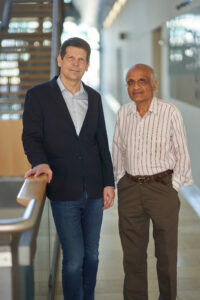Agriculture
December 18, 2023—The smell of freshly cut grass is a scent many people enjoy, but from the grass, it is a warning. That smell is something grass emits in response to an attack. Another expression plants give to an attack are peptides, which are strings of amino acids. Peptyde Bio uses these peptides to replace traditional pesticides with something found in nature.
“All plants produce peptides as part of their immune response to attacks,” said Tom Laurita, PhD, who until recently served as Interim-CEO of Peptyde Bio. “Plants can’t run away, so they have very complex natural chemical immune systems. That led us to think differently about pesticides—rather than just producing a synthetic chemical, what about utilizing something that’s naturally occurring? We worked to discover which peptides are active against various fungal diseases that different crops face. When we found ones that are potent, we tested them against many diseases to see if it can stop the process or the harm.”

Former CEO of Peptyde Bio, Tom Laurita (left), stands with Danforth Center scientists Dilip Shah, PhD. Photo by Peptyde Bio
Laurita is the CEO of the Danforth Technology Company (DTC) located in St. Louis, which spins off early-stage startups from technologies developed at the Donald Danforth Plant Science Center. DTC launched Peptyde Bio in 2022 based on antimicrobial peptide technology developed over 20 years by Danforth Center scientists Dilip Shah, PhD and Kirk Czymmek, PhD. The Wells Fargo Innovation Incubator (IN2) played a key role in the company’s development after including it in Cohort 11 in the spring of 2022 just as Peptyde Bio started its growth.
“The IN2 funding was used to hire top scientists to create a knowledge base of all the peptides in the public sphere,” Laurita said. “We discovered then tried to understand what part of the peptide is causing this effect, making it something that kills a pathogen. It’s a very new field.”
Peptyde Bio was a merger of plant science and data science. Working with the Danforth Center and IN2 helped grow the data science part of their research and development.
“The combination of the IN2 and the Danforth Center, plus the St. Louis ecosystem, has really been a winner for the development of the company,” Laurita said.
In early December 2023, Cambridge, Massachusetts-based Invaio Sciences acquired Peptyde Bio, marking the first startup to successfully exit the DTC. Invaio, founded by Flagship Pioneering, is a bio platform company that aims to accelerate the leap to nature-positive agriculture.
“We’re delighted to bring Peptyde Bio into the Invaio fold,” said Yajie Niu, chief science officer at Invaio. “This will further enhance Invaio’s AI discovery platform, enabling us to speed new biological actives into the hands of growers, and making Invaio’s the most advanced bioactive discovery platform and pipeline in the industry.”
Laurita believes Peptyde Bio got to this milestone with the support of IN2 and the Danforth Center, and the day-to-day knowledge that comes from both.
“The Danforth Center really is a fertile place to develop these kinds of opportunities,” he said. “And IN2 helped lead us to cutting edge technology.”
